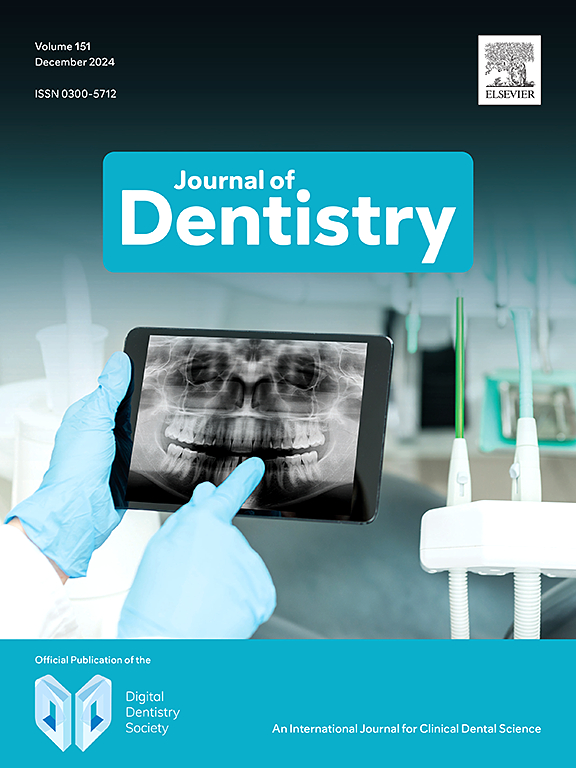Determinants of patient regret following tooth extraction due to severe periodontal disease: A cross-sectional survey
IF 5.5
2区 医学
Q1 DENTISTRY, ORAL SURGERY & MEDICINE
引用次数: 0
Abstract
Objectives
This study aimed to identify factors associated with patient regret following tooth extraction due to severe periodontal disease. The focus was on sociodemographic characteristics, oral health status, autonomy preferences, and patients’ experiences with tooth extraction, with the goal of informing the development of personalized decision-support strategies within a shared decision-making framework.
Methods
The final analysis included 722 patients who had undergone tooth extraction due to severe periodontal disease and had provided complete survey responses. Data included sociodemographic factors, oral health status (modified Adult Oral Health Standard Set), autonomy preferences in clinical decisions (modified Autonomy Preference Index), and patients’ experiences related to tooth extraction (modified Decision Regret Scale). Internal consistency was assessed using Cronbach’s alpha, and ordinary least squares regression was performed to identify significant predictors of regret.
Results
Regression analysis revealed significant associations between higher levels of regret and poorer self-reported oral health, stronger preferences for autonomy, inadequate pre-treatment information, and lower alignment between expected and actual treatment outcomes (P < 0.05). Notably, the adequacy of clinician-provided information and expectation concordance demonstrated the strongest statistical associations with regret. Patients who reported stronger preferences for decisional autonomy also expressed greater regret, dissatisfaction, and perceived harm after treatment.
Conclusions
Patient regret following tooth extraction was notably influenced by pre-treatment communication, expectation management, autonomy preferences, and oral health status. These findings underscore the importance of individualized, preference-sensitive, and shared decision-making strategies in enhancing patient-centered care and reducing regret in irreversible dental procedures.
Clinical significance
Understanding the determinants of regret can guide clinicians in adopting personalized communication strategies, thereby improving patient satisfaction and reducing decisional regret in irreversible dental treatments.

严重牙周病患者拔牙后后悔的决定因素:一项横断面调查。
目的:本研究旨在确定患者因严重牙周病拔牙后后悔的相关因素。重点是社会人口学特征、口腔健康状况、自主偏好和患者拔牙经验,目的是在共同决策框架内为制定个性化决策支持策略提供信息。方法:对722例因严重牙周病而行拔牙手术并提供完整问卷调查的患者进行最终分析。数据包括社会人口学因素、口腔健康状况(修改后的成人口腔健康标准集)、临床决策中的自主偏好(修改后的自主偏好指数)和患者拔牙相关经历(修改后的决策后悔量表)。使用Cronbach's alpha评估内部一致性,并使用普通最小二乘回归来确定后悔的显著预测因子。结果:回归分析显示,较高的后悔水平与较差的自我报告口腔健康、更强的自主性偏好、不充分的治疗前信息以及预期和实际治疗结果之间的一致性较低存在显著关联(P < 0.05)。值得注意的是,临床医生提供的信息的充分性和期望一致性显示了与后悔最强的统计关联。报告更倾向于决策自主的患者在治疗后也表达了更大的遗憾、不满和感知伤害。结论:拔牙前沟通、期望管理、自主偏好和口腔健康状况对患者拔牙后悔有显著影响。这些发现强调了个性化、偏好敏感和共享决策策略在加强以患者为中心的护理和减少不可逆转牙科手术的遗憾方面的重要性。临床意义:了解后悔的决定因素可以指导临床医生采取个性化的沟通策略,从而提高患者满意度,减少不可逆牙科治疗的决策后悔。
本文章由计算机程序翻译,如有差异,请以英文原文为准。
求助全文
约1分钟内获得全文
求助全文
来源期刊

Journal of dentistry
医学-牙科与口腔外科
CiteScore
7.30
自引率
11.40%
发文量
349
审稿时长
35 days
期刊介绍:
The Journal of Dentistry has an open access mirror journal The Journal of Dentistry: X, sharing the same aims and scope, editorial team, submission system and rigorous peer review.
The Journal of Dentistry is the leading international dental journal within the field of Restorative Dentistry. Placing an emphasis on publishing novel and high-quality research papers, the Journal aims to influence the practice of dentistry at clinician, research, industry and policy-maker level on an international basis.
Topics covered include the management of dental disease, periodontology, endodontology, operative dentistry, fixed and removable prosthodontics, dental biomaterials science, long-term clinical trials including epidemiology and oral health, technology transfer of new scientific instrumentation or procedures, as well as clinically relevant oral biology and translational research.
The Journal of Dentistry will publish original scientific research papers including short communications. It is also interested in publishing review articles and leaders in themed areas which will be linked to new scientific research. Conference proceedings are also welcome and expressions of interest should be communicated to the Editor.
 求助内容:
求助内容: 应助结果提醒方式:
应助结果提醒方式:


